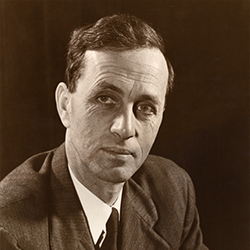Arthur Fisher, 1951-1960
Acting, May 1951-September 1951

Arthur Fisher was born in Chicago in 1894. He was the son of Walter L. Fisher, a prominent attorney who served in the cabinet of President Taft as Secretary of the Interior from 1911 to 1913. Arthur Fisher graduated from Harvard College magna cum laude and, in 1920, from the Harvard Law School, where he had been the student of Felix Frankfurter, future Supreme Court justice. In 1921, he took a job as professor of constitutional law at the University of Montana and editor of a newspaper in Missoula. From 1925 to 1939, he practiced law in Chicago, and for twelve years was a partner in the firm of Butler, Lamb, Foster, and Pope and its successors.
During World War I, Fisher served in the Veterans Administration, the U.S. Food Administration, and the Emergency Fleet Corporation. During World War II, he was manager of the compliance department of the New England regional office in Boston of the War Production Board from 1941 to 1946.
Fisher joined the staff of the Copyright Office in 1946 as Associate Register, became Acting Register in May 1951, and Register of Copyrights in September 1951. An authority on international as well as national copyright law, Fisher was interested in furthering the international protection of literary property. He represented the United States at a number of international copyright conferences and was also active, both nationally and internationally, in fields related to copyright, such as design protection and neighboring rights. As Register, he led the drive that made the United States an adherent, for the first time, to a world-wide copyright agreement, the Universal Copyright Convention. In 1950, he traveled to Cuba to learn about the operation of the Cuban copyright law and to remove barriers to the protection of U.S. works.
Fisher obtained funding from Congress for a series of thirty-four studies of U.S. copyright law that examined the current law and comparable laws of foreign countries and international conventions, analyzed numerous issues, and suggested various solutions. Prepared under his direction, these studies provided the groundwork for the general revision of the U.S. law that ultimately resulted in the 1976 Copyright Act. These studies were published by the U.S. Senate Committee on the Judiciary as Studies on Copyright. They were compiled and edited under the supervision of the Copyright Society of the U.S.A., of which Fisher was a founder, and published as the Arthur Fisher Memorial Edition.
An accomplished outdoorsman, Fisher knew agriculture and animal husbandry. He operated a dairy farm in Sudbury, Massachusetts, in the late 1930s, and at the time of his death, owned a beef cattle farm in Sugar Loaf Mountain, Maryland. As a lawyer in Chicago, Fisher advocated for preservation of forests and public access to the areas. He led an advocacy group that worked to establish Dunes Park in Illinois as a wilderness area and wildlife refuge. According to Abraham Kaminstein, Fisher was an accomplished ice skater and a “legendary hiker.” Fisher was chairman of the board of trustees of the Washington Educational Television Association and tried unsuccessfully to establish an educational television channel in the District of Columbia in the early 1950s.
Fisher died on November 12, 1960, in Washington, DC, of acute leukemia.